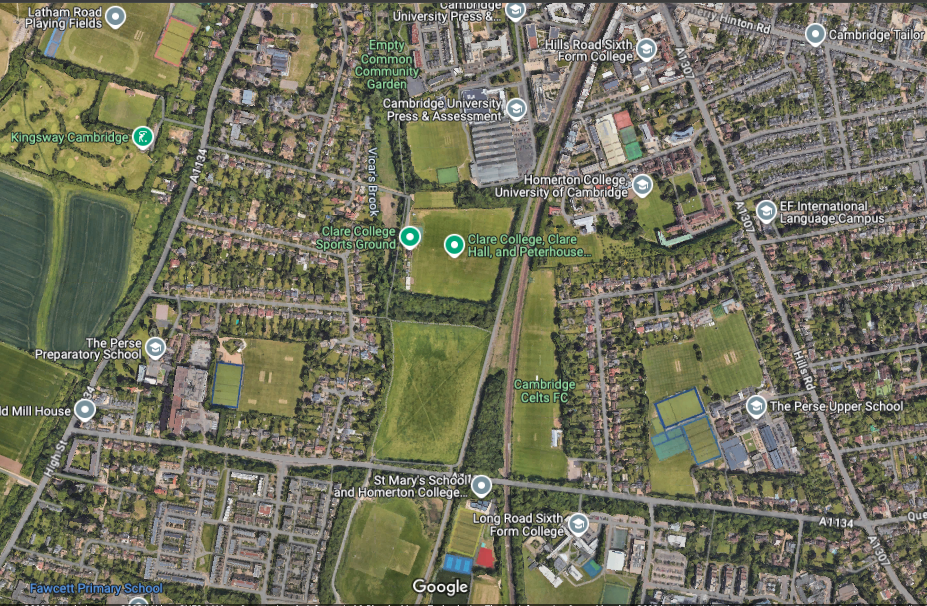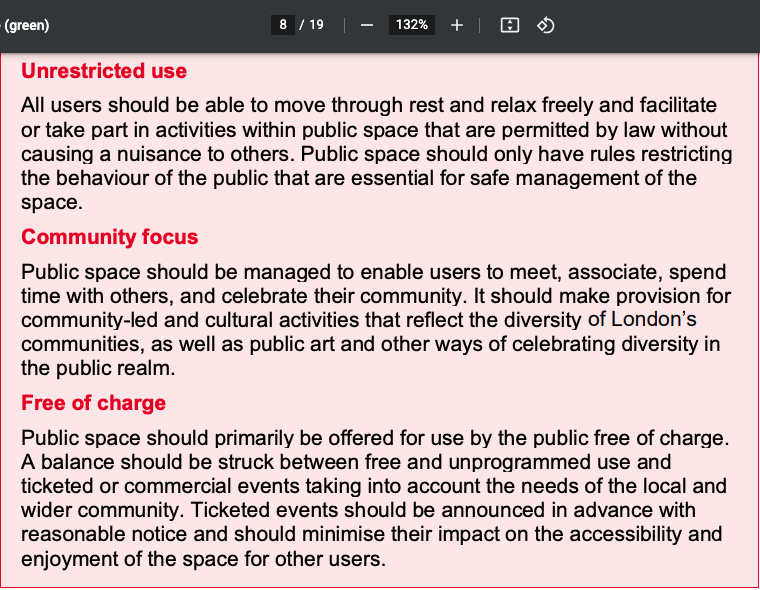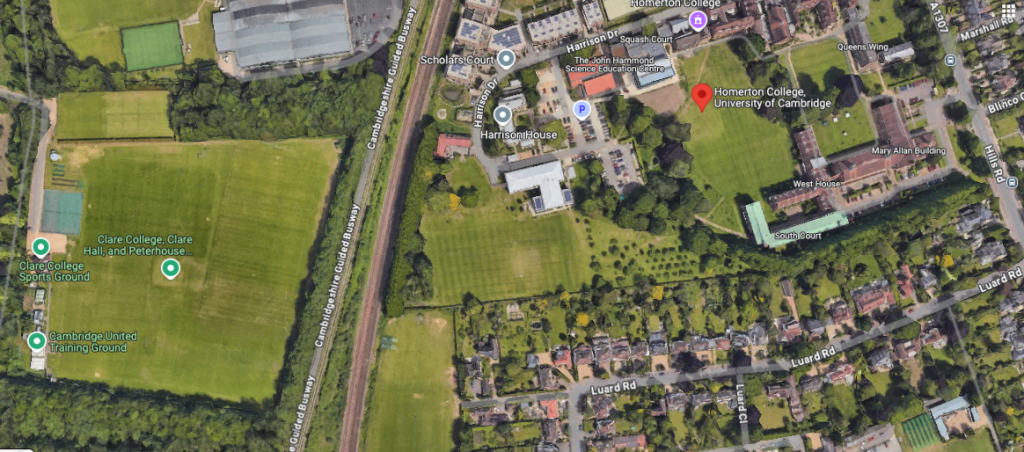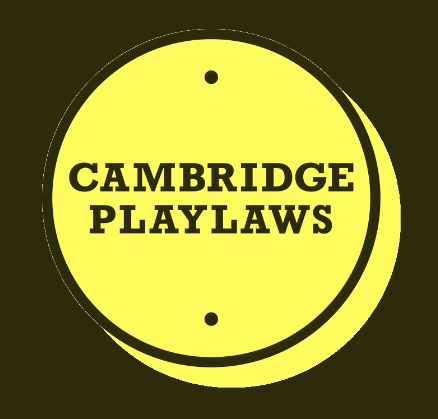I’ve moaned about this for years if not more. As Cambridge’s population grows, the pressure for access to large open green space will only grow. And that raises issues of fairness, as one youngster told me last summer at a Cambridge Playlaws event.
At what point does unequal access become unsustainable?

Above – a fair amount of green space, but who gets to enjoy it and on what terms?
Here’s me moaning about this seven years ago.
Above – from a time when I was making short video clips like this for fun
That was in August 2016. A few years later I asked about making existing green spaces open to the public.
To be clear, it’s not ownership I’m concerned about here, it’s access. At the same time, there’s a lesson from Dr Zhivago. Picture the scene during WWI in 1917 just after the Tsar of Russia has been overthrown.
Above – Dr Zhivago finds his town house has been nationalised and turned into a workers’ co-operative in order to house the many homeless.
At what point does society say: “Ya Basta! – Enough!”? (A phrase I recall from my student days nearly a quarter of a century ago in the then left-wing anti-IMF/WTO/World Bank protests.) The risk being that rising and extreme inequalities have a habit of creating more extreme and violent reactions. Global history tells us that. Furthermore, such moves can have very long historical footprints – such what’s happening in Iran. The threat of what is now BP being nationalised resulted in US/UK intervention that overthrew a democratically-elected head of government. A quarter of a century of oppression later and that intervention and the imposition of a pro-western ‘strong man’ backfired and resulted in the situation today.
A public charter for Cambridge on access to green spaces?
As far as Cambridge is concerned, The Public London Charter makes for interesting reading. Published in 2021, it’s part of the London Plan

Above – from the Public London Charter (2021).
Questions worth asking:
- How much of the above currently applies to the green spaces?
- How regularly are they used by the current owners or those they let the facilities out to?
- Does this represent best value for the people of our city?
Successive generations of adults – including my one, have failed generations of children and teenagers
I wrote about this here – something which points to national public policy failures more than anything else, as local government became the administrative arm of central government. The comparison with Sir Rodney Brook is striking
Above – you can also read the book review of the former Chief Executive of West Yorkshire County Council.
My point being that local government in Cambridge has neither the powers or resources to ensure public access to large open green spaces. Hence why a decade ago through the medium of a cuddly toy Twitter account at the ballot box, I called for much more civic responsibility from large and wealthy institutions towards the rest of our city. And was completely ignored. But hey, we got a dragon slide at Coleridge Rec out of it.
Back to the lack of playing field access.
In the olden days when no one could afford to lock up their premises properly, it was easy for us children and teenagers to hop through a hole in the fence or walk through an unlocked gate to play football. By the Millennium this started to change – not least the bringing in of criminal offences such as aggravated trespass, which hence the situation we have now. I’d like to think school playgrounds were made for children but hey.
This also reminded me about putting on things for both children and adults as well. (What would a playground for adults be like?) I pondered this back in 2012 in an article on school sports, coming to the conclusion that whatever the offer inside and outside of schools, they needed to be:
- Available
- Affordable
- Accessible
- Enjoyable
- Sociable
But if you cannot afford to get into the private schools, or afford any of the activities hosted by them outside of normal school hours, that’s the vast majority of the local residential community potentially barred from using things built in their local area. You only have to look at the huge numbers of teenagers whose places of education are disproportionately concentrated within a small part of the sub-region. (i.e. going beyond county boundaries).
One of my otherwise hopeless suggestions has been to create a new medium-sized part round the back of Homerton College

Above – from G-Maps here
In the 1980s & 1990s as children we used to have access until adults closed it off. My preference is to open up the football pitch just below Harrison House and the patch of land below-left of it (part of Hills Road’s playing field that is unused) and have the two colleges share a football pitch that’s otherwise under-used.
The Perse Swimming Pool nears completion
In the early 1990s I recall playing tennis on their old tennis courts because a friend of a friend went to the school and he said it was OK so along I went. You couldn’t do that today though. Not least because those old courts have been built over!
What is one of the most exclusive private schools in the country has left the University of Cambridge floundering when it comes to swimming pool design and construction. While the splendid chaps in Senate House and the collage finance committees still squabble over who should pay for what they covenanted to provide in return for Eddington being built, The Perse got on and secured planning permission (give or take some community access concessions from Cambridge City Council – I wrote about it here back in early 2022) and got on with building what will be a large, private swimming pool. It is now nearing completion. My hope is that the site will provide some much-needed relief for Parkside Pool (still way over-capacity) in that the new pool will take some of the strain from private bookings of swimming clubs and of the private language schools. I also hope that there will be daytime booking slots for both the students at Long Road Sixth Form College and the Cambridge Academy for Science and Technology.
Much depends on how closely the council officers monitor compliance with planning permission agreements. I hope that local residents and community groups will be vigilant to ensure that as many people as possible benefit, rather than just the few whose parents pay the school fees. Because Cambridge as a city is more than unequal as it is.
Food for thought?
If you are interested in the longer term future of Cambridge, and on what happens at the local democracy meetings where decisions are made, feel free to:
- Follow me on Twitter
- Like my Facebook page
- Consider a small donation to help fund my continued research and reporting on local democracy in and around Cambridge.
Below – Local Elections are coming up. A reminder to keep exchanges as civil as possible!

